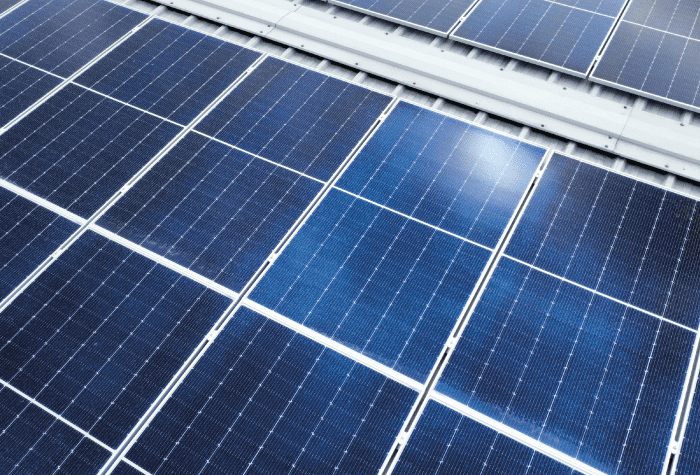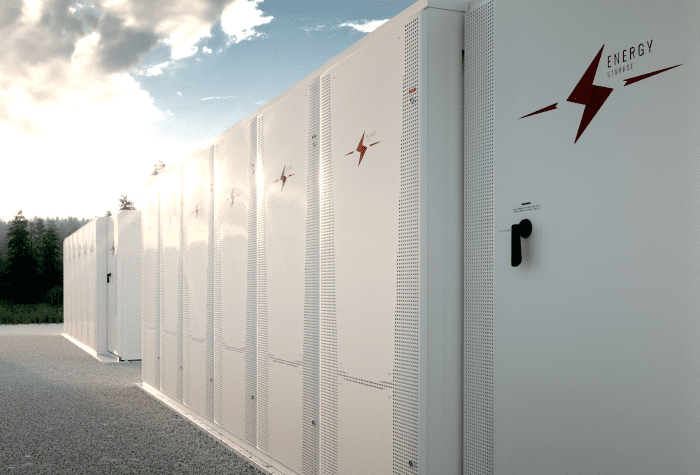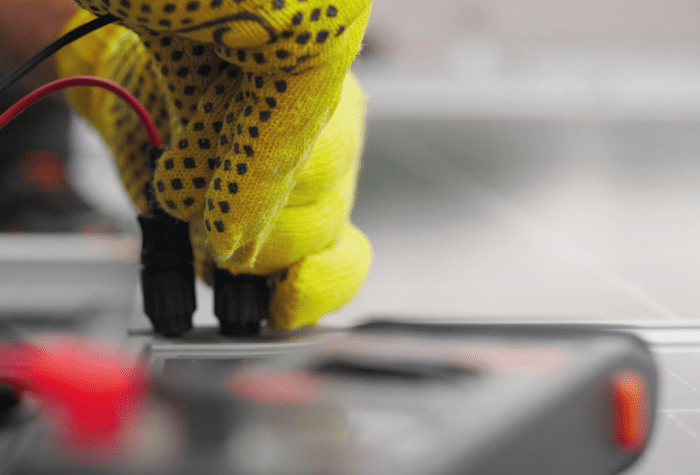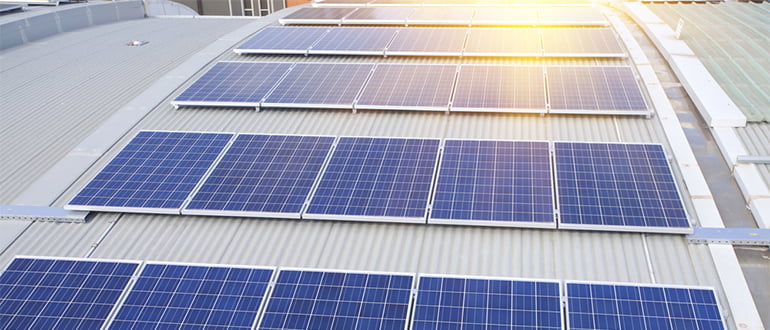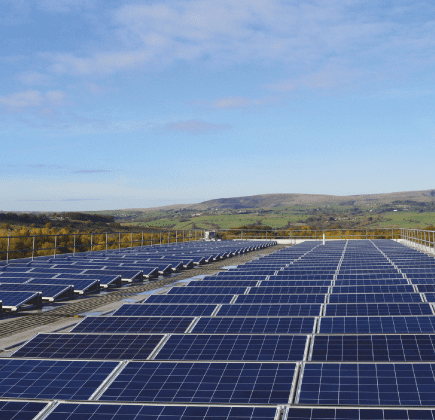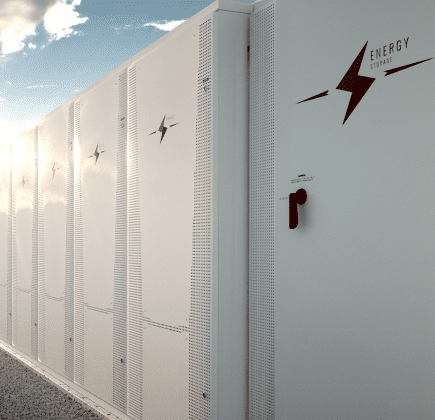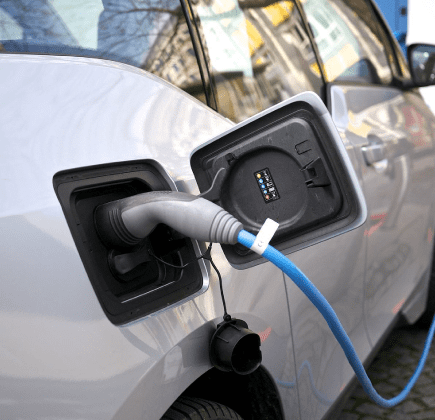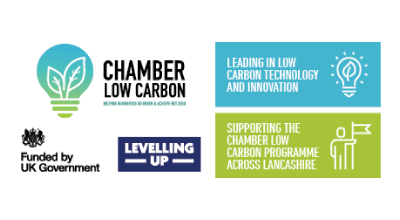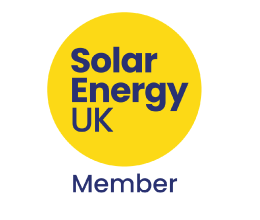- UK: 01282 421 489
- IE: 00 353 913 981 80

As you may have already guessed, this is one of the most first questions that our experts are often asked about commercial solar panels. And understandably so! The output and efficiency of a solar panel are some of the most useful indicators of how much value it’s able to provide a business or organisation, so it’s natural to want it to be as efficient as possible. Now, it’s difficult to give an general answer for how much energy they generate, since the answer varies for each solar PV installation, and depends on a huge number of variables. We’ve listed some of the most pivotal ones below, so that you can get a rough idea of what to expect.
How efficient are solar panels?
Whereas older solar panels were capable of covering 6% of the energy from the sun, the efficiency of modern solar panels ranges between 15% and 25%. Figures like 15% might not sound like all that much when taken in isolation, but don’t forget that when it’s applied to the annual energy bill of a business, it can equate to savings of hundreds or even thousands of pounds.
What’s more, the technology is evolving all the time, and the rapid evolution of the renewables industry means that solar panels are only getting more efficient with every passing year. There are already solar panels in development that have achieved a 42% efficiency rate in laboratory conditions, providing just a glimpse of what’s to come in future!
The performance of solar panels is generally guaranteed for at least 20 years, and they lose a minuscule amount of efficiency each year, normally about 0.5%. This means that after 20 to 25 years, the panels will still be working to around 85% of their original capacity – more than enough to give you a sizeable Return on Investment.
How much energy can I generate with my solar panels?
That depends. As we touched on above, every solar panel installation is different, and outputs can vary drastically between each one. The overall efficiency of your own solar panels is influenced by a number of factors – we’ve listed the main ones below.
The size of your system and the number of panels
The size of your system will be based on your own individual energy profile, and your average usage throughout the year. Obviously the more energy you use, the more solar panels you’ll need to help you offset the costs.
Here at Low Carbon, most of our clients are larger commercial businesses or organisations, which tend to be a lot more energy-intensive and thus require larger installations. A manufacturing business or a large office building may require a 100kWh solar PV system, which would require something in the region of 300 solar panels. This is helped by the fact that larger commercial businesses are more likely to have more available roof space to dedicate to an installation.
The position of the panels themselves
You don’t need to be an expert to realise that the direction and angle of your roof matters, too. Ideally, your business solar panels should be at a 35 degree angle on a south-facing roof in order to get maximum sunlight to convert into usable energy. But you’ll be glad to hear that your installation doesn’t have to meet these requirements to the letter in order to get you great results. Even if your installation is on an East or West facing roof, or angled between 10 to 60 degrees, it can still get plenty of sunlight – more than enough to make it a worthwhile investment.
To be honest, the main consideration when positioning your solar panels will be the amount of shade that might get cast over them. Roofs that are permanently overshadowed by other buildings don’t always make the best candidates for a solar panel installation, so one of the first steps for any potential installation is to assess how much shade regularly falls over the proposed site over the course of a normal day.
The number of peak daylight hours
Naturally, this is heavily dependent on the time of year, and to some extent the weather as well. Summer is when solar panels tend to be at their most effective, because the days are longer and the skies tend to be brighter. It also depends on exactly where you’re based in the world. As you might expect, commercial solar PV is popular in brighter, warmer countries where sunshine is plentiful, but it can still yield great results in countries with cooler climates too. (Germany, for example, is known for its relatively temperate climate, but remains one of the world leaders in solar technology.)
The rating of your panels
With any given solar panel, if you combine the efficiency of the cells with the size of the panel, it produces a figure for the power rating, which is measured in watts. The higher the rating, the more power that the solar panel is capable of producing. A common solar panel might be rated for 350 watts, whereas the more sophisticated models can be rated as highly as 520watts.
When are solar panels most efficient?
The million dollar question. We’ve already touched on part of the answer above – on a day-to-day basis, solar panels are most efficient during peak sun hours, and noticeably more so in the summer than in the winter, since they’re more likely to have unfettered access to greater periods of sunlight.
Summer days generally have between four and six peak hours of sunlight, broadly between 9am to 3pm. Winter days have a much narrower window of peak sunlight, generally between one and three hours around noon of each day.
However, it’s worth us reiterating that solar panels are still quite capable of producing a surprising amount of energy, even on cloudy days. This is because the bare minimum they require is daylight, rather than specifically sunlight – although the latter is always a bonus! Plus, don’t forget that it’s actually the local cost of electricity that has one of the most profound (and underestimated) effects on the scale of your savings, rather than the amount of regular cloud cover.
Can solar panels overheat?
Technically, yes. Solar panels tend to get less productive when the mercury rises above 25°C (they’re much like humans in that regard). This tends to be accounted for in the manufacturer’s data sheet, which includes a temperature coefficient figure to indicate how much power would be lost for every degree the temperature rises above 25°C. A system that faces consistently high temperatures in excessively hot climates can often see reduced outputs.
Happily, here in the UK, panels very rarely face these kinds of issues. Our moderate climate means that temperatures tend to stay relatively steady throughout the entire year, so the output of your solar panel installation is very unlikely to be affected by extreme temperatures for sustained periods.
What can I do to maximise the efficiency of my solar panels?
To be honest, the efficiency of a given solar PV system is largely determined in the way it’s set up and installed, which is just one of many reasons why it’s important to use experienced specialists like our experts here at Low Carbon Energy. We’ll assess your individual energy profile and usage when assessing your premises for the installation, helping us to determine the optimum setup that will yield the best results for you.
Once the solar PV installation is complete, your only concern will be maintenance. Happily, they don’t require a hugely intensive maintenance schedule – just the occasional once-over to ensure they remain clear of dust, dirt and debris. If it’s been snowing heavily recently, it’s also worth checking your panels, as layers of snow can sometimes prevent them from getting as much sunlight as they would normally.
For those moments when your solar panels do need maintenance, we wouldn’t recommend trying to tackle the job yourself. Solar panels can easy to damage if you don’t know exactly what you’re doing, so it’s far better to entrust the job to some professionals.
Plus, if you’ve got any questions about the efficiency or output of your own solar panel installation, our experts here at Low Carbon Energy are here to help. We have over 30 years of combined experience behind us in helping you save on business costs, and profit from having cleaner energy. To find out how we can help you, feel free to give us a call today on 01282 421 489!
 Energy Technology
Energy Technology

Inspiring change today
Call us on 01282 421 489
